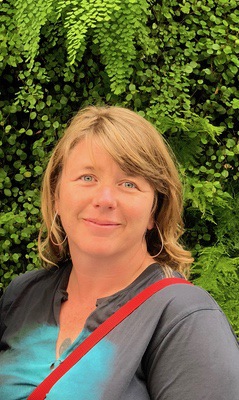
Amanda Moore
Creative Nonfiction
Amanda Moore’s poetry has appeared in journals and anthologies including ZZYZVA, Cream City Review, Tahoma Literary Review, Best New Poets, and Mamas and Papas: On the Sublime and Heartbreaking Art of Parenting. She is a high school teacher and lives by the beach in the Outer Sunset neighborhood of San Francisco. More about her work at http://amandapmoore.com
Transmutation
The girl’s body is changing, has betrayed her in its quest to become a woman, and she’s fighting it with baggy sweatshirts, a reluctance to shower, and a refusal to discuss bras. When she changes into her pajamas at night, she turns her back if I am in the room, and at the pool she puts on her suit in a bathroom stall. Gone are the naked sprints she used to take around the living room after baths, her comfort in her skin, and she doesn’t want to talk about it.
I meet my husband out for lunch, some time alone. He can hardly keep from grabbing at me beneath my jacket. “I miss your body,” he says, and for a second I am sorry I have let it become such a stranger to us both. We discuss carpools and grocery shopping, what to make for dinner. “See you at home,” he says when we part with a kiss, and as he pulls away I recline the front seat and fall immediately into a deep, dreamless sleep. It is my third month of chemo, and I have never been so tired, not even in pregnancy.
From across the country, my friend sends me a selfie she takes from her front seat in the Target parking lot and I examine it closely. Her hair is growing back curly as mine will later, though it’s hardly a victory that she has had to stop treatment. Her boys at camp and her husband at work, we have time to compare new side effects. She tells me about one-breasted sex, and I tell her about pinching the fat on my belly before plunging the needle in, the taste of saline in my mouth when I’m done. “On the upside,” I text,” I’m wearing my skinny jeans.” “Well, Amen for poison,” she writes back.
The girl and I are alchemy and alteration, our bodies making themselves into new forms. The changes are nuclear, biological, and somewhat mythical, worn paths that are nevertheless strange. I do not know whether I will emerge with a body at all; she doesn’t know what hers will become. We have not found a way to talk about any of it.
At the dinner table, my husband beholds us with pleasure: “My two beautiful girls,” he says, beaming. He doesn’t know any better, the turmoil we are beneath our physical forms. The girl rolls her eyes. I roll my eyes. “Oh, you two,” he says, looking back and forth at us, and I like the sound of it: like she and I are a conspiracy and everything is normal.
The girl burrows toward me as we read before bed, warm and lulling. I don’t mean to fall asleep and when I wake I am disoriented: her new angles and nubs pressing against my side make her seem a stranger, a body that didn’t come from mine. Her room is cluttered with discarded jeans, an empty backpack, tubes of lip gloss, forgotten stuffed animals crowded in the corners. She sighs and shifts in her sleep, but I’m not nostalgic, holding my breath for a glimpse of the little girl she used to be to surface. Instead, I will time forward a little faster. I want to know how she turns out, what kind of woman she becomes.
